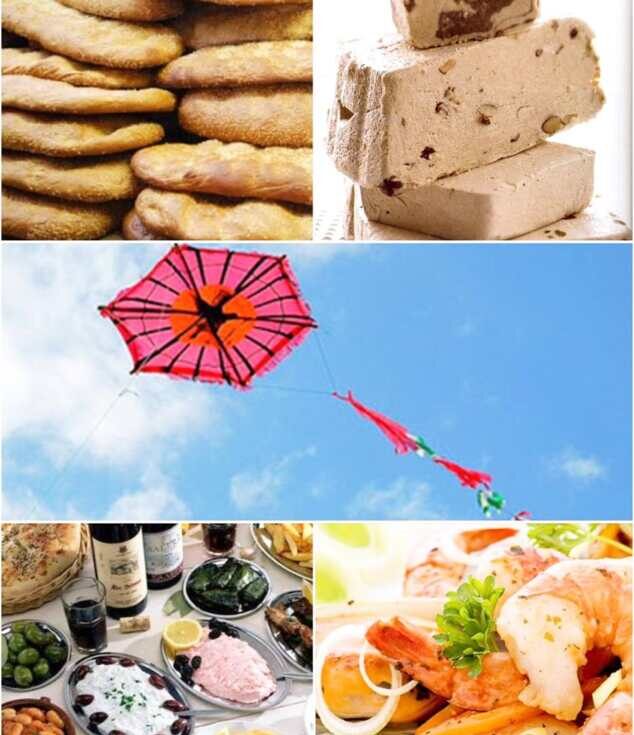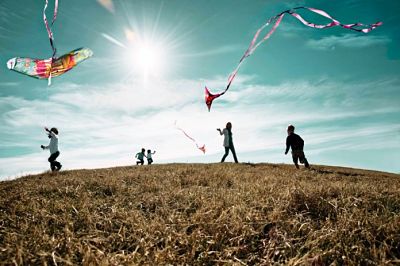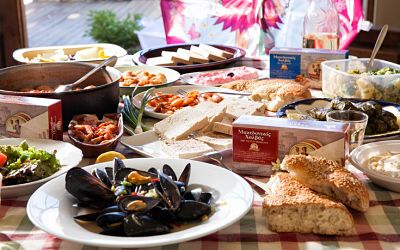
Kathara Deftera,” Greek for Clean Monday, is considered to be one of the most important feasts all over Greece, each year commencing the 40-day period of the Great Lent for the Eastern Greek Orthodox Church, which is called “Sarakosti.” The feast begins on the first day of the 7th week before the Orthodox Easter Sunday.
Clean Monday is a public holiday in Greece and Cyprus, where it is celebrated with outdoor excursions, the consumption of shellfish and other fasting food, a special kind of azymebread, baked only on that day, named Lagana and the widespread custom of flying kites.

Eating meat, eggs and dairy products is traditionally forbidden to Orthodox Christians throughout Lent, with fish being eaten only on major feast days, but shellfish is permitted in European denominations.
This has created the tradition of eating elaborate dishes based on seafood (shellfish, molluscs, fish roe etc.).

Clean Monday, however, is not only associated with eating fasting products, but features also many traditions being held all over Greece. Traditionally, as Clean Monday is considered to mark the beginning of the spring season.
Apart from kite flying, many areas in Greece maintain their own regional customs. In Thebes, an old custom dating from 1830, called the “Vlach Wedding,” — in reference to the matchmaking of the time — is revived each year, with all participants joining the festivities with satirical songs and lots of dancing.
Meanwhile, in the village Mesta on the Greek island of Chios, according to another Clean Monday custom, which bears its roots from the period of Ottoman Greece, the village is invaded by an Ottoman military officer along with his troops, who after gathering all residents to the central square, makes them pay a fine for the charges brought against them. The collected money is then given as tribute to the cultural association of the village.
The feast of Clean Monday and all associated traditions and celebrations are in the hearts of the Greek people, as they provide an opportunity for leisure and escaping from the daily routine, while coming in contact with nature and the country’s cultural heritage.






March 7, 2017
Pretty nice post. I just stumbled upon your blog and wished to say that I’ve truly enjoyed browsing your blog posts. After all I’ll be subscribing to your rss feed and I hope you write again very soon!
http://educationpoint.eu
March 8, 2017
I constantly spent my half an hour to read this weblog’s articles all the time along with a cup of coffee.
http://educationclue.eu
March 8, 2017
Hi there, I enjoy reading all of your article post. I wanted to write a little comment to support you.
http://educationpoints.eu
March 8, 2017
Thank you
March 9, 2017
Hi, just wanted to say, I liked this blog post. It was helpful. Keep on posting!
http://healthhint.eu
March 9, 2017
Thank you
March 10, 2017
I don’t even understand how I finished up here, but I assumed this post was good. I do not recognise who you are however definitely you are going to a well-known blogger in case you are not already. Cheers!
http://goodtip.eu
March 12, 2017
You have made some really good points there. I checked on the net for more info about the issue and found most people will go along with your views on this website.
http://financetip.eu
June 1, 2017
I really liked your blog article.Really thank you! Great.
June 6, 2017
This is one awesome post.Really looking forward to read more. Really Cool.
July 8, 2017
Appreciate you sharing, great post.Really thank you! Keep writing.
July 25, 2017
Very informative blog article.Thanks Again. Awesome.
July 25, 2017
Thanks-a-mundo for the article post.Really looking forward to read more. Want more.
September 14, 2017
I am so grateful for your blog post.